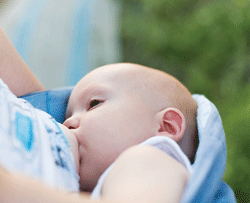Understanding Medicines and Breastfeeding
 The first week of August, 1–7, is World Breastfeeding Week. In Australia, most babies (96%) are initially breastfed and it’s a key contributor to infant health. At this time, let’s consider taking medicines when breastfeeding.
The first week of August, 1–7, is World Breastfeeding Week. In Australia, most babies (96%) are initially breastfed and it’s a key contributor to infant health. At this time, let’s consider taking medicines when breastfeeding.
Medicines can be defined as either prescription (only available with a prescription from a healthcare professional such as a doctor), over-the-counter (available without a prescription, often from a pharmacy) and complementary (e.g. herbal, natural and alternative medicines). Most medicines pass into breast milk but usually only in very small quantities. These quantities are generally too small to be harmful to the baby.
Many women will take some kind of medicine when breastfeeding. Some breastfeeding mothers may need to take medicine regularly to treat a medical condition. Others may take medicine occasionally when required to treat a sudden, limiting condition such as a headache, cough or cold. It is important when using any medicine while breastfeeding to consider the benefits to the mother compared with any risk it may pose to the baby. Discuss this with your doctor or pharmacist.
Some medicines are available over-the-counter both in pharmacies and from the supermarket. These medicines are easily available. Before taking any of these medicines, ask the pharmacist if they are safe to take while breastfeeding and confirm the correct dose. Check the active ingredients as the type and strength may differ between brands and you don’t want to take more than is required. If you are unsure, always check with the pharmacist. Medicines such as simple pain relievers (e.g. paracetamol and ibuprofen) are safe to take by breastfeeding mothers in the lowest recommended dose.
Many cough and cold medicines contain a combination of ingredients to treat the symptoms of coughs and colds. Some of the active ingredients in these preparations may interfere with the mother’s ability to make milk (e.g. oral decongestants), or cause side effects in your baby (e.g. codeine, sedating antihistamines, or oral decongestants). Avoid cough and cold preparations that contain a combination of ingredients when breastfeeding. Instead, if needed, it is sometimes safer to use cough and cold preparations with only one active ingredient to treat a specific symptom of your cold. Other ways of relieving cough and cold symptoms that do not require taking medicines include resting, drinking plenty of water, gargling warm, salty water or drinking honey and lemon drinks.
Some medicines should not be taken when breastfeeding. Chemotherapy agents (drugs for cancer), ergotamine derivatives (e.g. bromocriptine), gold salts, iodine, amiodarone, radiopharmaceuticals (for nuclear medicine scans), and illegal or street drugs should not be taken when breastfeeding.
Our pharmacists at Fresh Therapeutics can help. Pharmacists are medicines experts. They can provide you with advice about taking medicines when breastfeeding. They may be able to suggest alternative ways of helping relieve troublesome symptoms such as using a nasal spray rather than taking a tablet. Always make your doctor and pharmacist aware that you are breastfeeding if you are being prescribed or taking medicines.
Detailed information on medicines and breastfeeding is available from the Self Care Fact Card, Medicines and breastfeeding, which is available from all Fresh Therapeutics Pharmacies.
NPS MedicinesWise is a helpful consumer website that has information about medicines and breastfeeding. You can find this site at www.nps.org.au and search for breastfeeding.
Also MotherSafe is a free telephone service for the women of NSW, based at the Royal Hospital for Women, Randwick. MotherSafe provides a comprehensive counselling service for women and their healthcare providers concerned about exposures during pregnancy and breastfeeding. Such exposures may include:
- Prescription drugs
- Over-the-counter medications
- Street drugs
- Infections
- Radiation
- Occupational exposures
Some women may be offered face-to-face counselling appointments at the MotherSafe clinic which is held each week at the Royal Hospital for Women, Randwick. An interpreter can be arranged for women who do not speak English. Phone: 9382 6539 (Sydney Metropolitan Area) or 1800 647 848 (Non-Metropolitan Area). Non-English speakers can access an interpreter through TIS National by phoning 131 450. You should tell the operator the language you speak, as well as the name and phone number of the organisation you wish to contact. There is no charge for interpreter costs when contacting a government-funded service or agency (such as MotherSafe or the Royal Hospital for Women).
Remember; always talk to a pharmacist, doctor, or other health professionals before taking any medicine when breastfeeding and take the exact dose prescribed.
